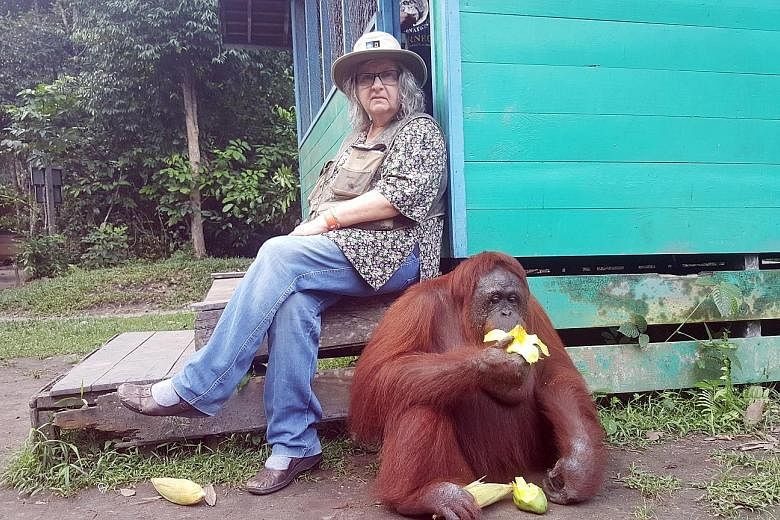As soon as the door of her metal cage was opened, female Bornean orangutan Poco, 14, climbed to the top of a tree and settled herself on a branch. Shortly after, 13-year-old male Rich was released. He grabbed a hanging vine and swung himself towards her.
The pair vanished into the wilderness in Seruyan district, Central Kalimantan province. But before long, Poco's surly grunts rang out.
"Ah, that's the sound of the female rejecting (the male). Rich is trying to mate with Poco and she's saying 'No, no, I don't want'," said Dr Birute Galdikas, Canadian primatologist and author of Reflections Of Eden who has spent over four decades studying orangutans in the Borneo jungles.
As the head of the Orangutan Foundation International (OFI), she led the release of the orangutans into the wild last Thursday. It was part of a programme to conserve the critically endangered primates and preserve their habitat.
Dr Galdikas obtained a bachelor's degree in psychology and zoology in 1966 and a master's degree in anthropology in 1969, both from the University of California in Los Angeles. There, she met Kenyan anthropologist Louis Leakey and spoke to him about her wish to study orangutans.
She then became one of three women, known as "The Trimates", chosen by Dr Leakey to do research on primates. The others were British primatologist Jane Goodall, who studied chimpanzees,and the late American primatologist Dian Fossey, who studied gorillas.
Dr Galdikas first arrived in Central Kalimantan in 1971 with her first husband, photographer Rod Brindamour. They had a son. In 1981, she married Borneo native and Dayak farmer Pak Bohap Jalan and they have two children. Now 70 and a leading expert in her field, she is showing no signs of slowing down.
She said uncontrolled burning by errant palm oil companies and illegal logging are to be blamed for the orangutans' habitat loss. The primates are also being hunted illegally and eaten by some villagers, so there are only 50,000 of them left in the wild, she said.
The International Union for Conservation of Nature and Natural Resources said the number of Bornean orangutans has shrunk by 60 per cent between 1950 and 2010. It classified the species as "critically endangered" last month.
Dr Galdikas believes education will eventually end the local practice of eating orangutan meat, while tourism will create jobs for the locals and discourage them from working in palm oil businesses.
But the world can do the orangutans a favour now, she said. "Don't buy palm oil, as there aren't enough forests for the orangutans."
Of the 330 rescued Bornean orangutans in OFI's care, 200 are suitable for release but have nowhere to go, she told The Straits Times.
"Palm oil companies use fire to expand their concessions. Once the fires destroy the forests, they will just move in and plant. Some of them pay local people to burn and spread the fire," she said.
Indonesia is the world's largest producer of palm oil, which is used in items ranging from shampoos to bread and ice cream, and the industry employs millions.
Indonesia's Borneo and Sumatra islands, home to the great Asian apes, were hit hard by last year's regional haze. Fires, blamed largely on palm oil and pulp-and-paper firms, had sent acrid smoke to countries in South-east Asia, including Singapore, and brought Indonesia to the brink of a national emergency.
Shocking images of sick and dehydrated orangutans, including infants rescued from charred wasteland, were widely reported.
Dr Galdikas said some firms, such as Sinar Mas Agro Resources and Technology (Smart), a subsidiary of the world's second largest palm-oil company Golden Agri-Resources (GAR) which is sponsoring her programme, is "making an effort" to help the plight of wild orangutans.
Mr Agus Purnomo, GAR's sustainability and strategic stakeholder engagement managing director, said the company is committed to orangutan conservation and hopes others will do the same.
"As much as we would like to save the orangutans of Borneo, what OFI can do is (helping) only a few hundred. There are thousands of them that need help," he said, adding that fires on the company's concessions during the haze crisis last year were "less than 1 per cent".
With International Orangutan Day on Aug 19 just around the corner, Dr Galdikas hopes the gentle and peaceful creatures will "get their own space". "Humans have all kinds of wants," she said. "Orangutans aren't like that. Day to day, they eat wild fruits in the forest. At the end of the day, they'll sit there and look at the sunset, and they're perfectly calm, happy and satisfied."

